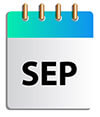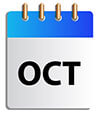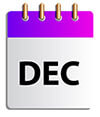Usually around this time of year I write a post on my predictions for business analysis professionals in the upcoming year, but Jacqueline and I decided this would be a fun topic for our first #AskAnAnalyst podcast episode of 2017. While discussing our predictions for our podcast prep, we got on the subject of, “What can we do to improve this year?” Within a few minutes, we had come up with quite a list of easy ways to improve as a business analysis professional.
I think it is important for all of us to find ways to improve each year. And it is easier if you break it down and not try to tackle it all at once. So, for all my readers out there, we came up with a 12-month plan. You may decide to do it faster, you may decide to pick a few items, or you may decide to only tackle one. Either way, I hope you will join us in the challenge to become a better business analysis professional in 2017! At the end of this post, I’ve also included a downloadable version of this checklist for you to track your progress. (Don’t worry if you don’t get started in January, this version of the checklist is flexible and allows you to write in your starting month.)
Note: I am in the business of business analysis, so some of these monthly challenges are specific to that topic. However, I tried to make them general enough that you can apply this list to any profession.
 Expand Your Professional Network
Expand Your Professional NetworkIf you have ever heard me speak or read anything I’ve written, you probably know that I am big on networking – huge, in fact. The truth is though that I think there is nothing more important than establishing a good community of people inside and outside your organization to support your efforts. Having a good working relationship with our co-workers is vital. I’d be willing to bet there are some people in your organization that you wouldn’t want to help – as a business analysis professional, you need to be someone who people enjoy and don’t mind taking time to support and collaborate with.
A great way to meet other professionals outside your company is through professional organizations. Being a member and attending meetings means being with others who have a passion for the profession. As a business analyst, our professional organization is the IIBA. Industry conferences are another great way to network and gain knowledge in a concentrated environment.
 Connect Socially
Connect SociallyThis is more of an extension of the expanding your professional network above than a new objective, but it is one that requires a different focus. And you can connect from the comfort of your desk or wherever you are with a connected device. Many of you might already be using social networks to connect with your friends and family, but are you using them to connect professionally? If not, you are missing out on a massive network of opportunity. Social networks provide a quick easy way to connect with and engage in your professional community. They also give you a way to give back to the community, learn about new techniques, and stay fresh on current topics and trends in the industry.
Another thing I see a lot is social media skimmers – those who are online but don’t engage. I commend you for these efforts, but I promise…the more you give, the more you will receive. Put yourself out there.
Some of the networks that I use most are:
 Find a Mentor / Be a Mentor
Find a Mentor / Be a MentorWhen I first became a BA, I was fortunate enough to have a great mentor. Now that I have been in the industry for 20 years (wow!), mentoring other BAs is one of my favorite things to do. Regardless of how long you have been in your profession, you can be a mentor and have at least one mentor.
 Work on Your T-Shape
Work on Your T-ShapeJacqueline recently wrote a blog post, From a Dysfunctional to Cross-Functional Agile Team, that highlights the importance of a T-shaped skill set. Take some time this month to determine what your horizontal and vertical lines looks like. Is the placement of your skills where you want it to be and in line with your team goals? Are there areas in which you need broader or deeper experience? If you found a mentor, they can help you.
 Step Out of Your Comfort Zone
Step Out of Your Comfort ZoneSounds scary, right? It doesn’t have to be! If you really want to grow, you are going to have to put yourself out there to learn new skills, techniques and maybe even a new area of expertise. By broadening yourself and being open to new opportunity, you can only make yourself more valuable as an employee and team member.
Early in my career I felt I needed to stretch myself and test my skills in a new business area. After multiple failed attempts at getting placed on a project team that was in a business area I did not know and solution I was unaware of, I did not give up. I finally got an invite to a team meeting. This was with strict instructions to just listen and keep my mouth shut. I listened for about 56 minutes of the 60-minute meeting…then I could not hold back any longer. The team really needed help to identify clear outcomes for the project. With little idea how I was going to help, I threw my name out to lead the effort. Who knows where I would have ended up today if I hadn’t taken the initiative, put my neck out on the line, and taken a big chance.
 Ask For / Provide Feedback
Ask For / Provide FeedbackSpeaking of getting out of our comfort zone…our instructor, Heather, just gave a great presentation at the BBC on feedback and its importance. At first glance you may think giving and receiving feedback is easy. I lump giving great feedback into the category of common sense, just not common practice. Since this post is about your growth, first focus on receiving the feedback.
Remember, feedback doesn’t always have to be bad. But you’ll never know what you are doing well and what you can improve on if you don’t ask.
 Read a BOK
Read a BOKA BOK or “body of knowledge” is a complete collection of concepts, terms and activities relevant to a profession. A body of knowledge is defined by an affiliated professional association and is a collection of information that covers the set of tasks, knowledge areas, and techniques required to fulfill the responsibilities of the applicable role. A BOK helps to endorse consistency in a profession and understand why you might use techniques in certain situations.
This might take you more than a month and may be more of a ‘summer’ goal, but get started. Since we are in the analysis space, I recommend the BABOK (for business analysis), PMBOK® Guide (for project management), BIZBOK (for business architecture) or the SWEBOK (for software engineering)…just to name a few.
 Take Time for Yourself
Take Time for YourselfHopefully this isn’t the month for your fiscal year-end (if so, switch with another month). For me, August tends to be a slower month than most since everyone is squeezing in their last trip of the summer. I know that when my family life is good, my work life is good and vice versa. It is an important balance to keep that a lot of people forget about. There is a great book called [amazon text=The Present&asin=0307719545]. It could help with this kind of stuff. Try extra hard this month to leave your work at work. And don’t forget to give me the credit when your significant other thanks you.
Did you hear that France just passed a “right to disconnect” law? In short, the new law allows workers to turn off their email after work hours! Interesting approach.
 Talk the Business Analysis Professional Talk
Talk the Business Analysis Professional TalkNow that you are knee-deep (or finished) with your BOK assignment from July, go back and take another look at the glossary. Be sure to take some extra time to understand these terms and be able to use them in context.
Knowing the language of your profession is essential. As a business analyst, does elicitation, scoping, strategy analysis, validation, verification, SMART objectives, stakeholder analysis, traceability, and wire frame mean anything to you? If not, start doing your research. What about SDLC, RACI, ROI, UML, BPMN, COTS, ERD, DFD, CRUD, UI, or UAT? I’d be concerned if you went to a job interview and did not know what someone meant by data models, data warehouses, workflow diagram, process model, a prototype, use case, agile, waterfall, iterative, or business rules.
 Improve Your Communication
Improve Your CommunicationA while back I became certified to provide DiSC Assessments. DiSC is a behavior style assessment used to help people understand their own style as well as those of the people they work with. Using this method to do a quick analysis of your stakeholders, co-workers, and family for that matter can save you a lot of headache. While there is a lengthier assessment that can give you deep insights into yourself and others, here is a quick lesson that you can apply on the fly.
Individuals usually exhibit behaviors of one or more of these styles. Each style has tendencies and therefore preferred ways of communication. To quickly get a sense of one’s styles you ask two questions regarding the person you are trying to read:
Based on the answer to the questions, the person will fall into one of four behavior styles.
| Questioning & Skeptical | Accepting & Warm | |
| Fast-Paced & Outspoken | Dominance | Influence |
| Cautious & Reflective | Conscientious | Steadiness |
Depending on which behavior style you determine, there are associated tendencies and recommendations on how to communicate.
Dominance
Influence
Conscientious
Steadiness
 Implement a New Tool
Implement a New ToolBusiness analysis is truly a skill set that can be done independent of any tool. The best BAs can even get by on just Microsoft products. The ‘tool’ world has officially exploded! There are document repositories, collaboration tools, rules modelers, requirement management tools, process management, workflow automation, use case management, prototyping tools, and many, many more. No matter what you need help with, there is a tool out there that can do it…and can save you vast amounts of time in the process.
 Capitalize on What You’ve Learned and Achieved
Capitalize on What You’ve Learned and AchievedIf you’ve done everything on this list, you’ve improved a lot this year. Don’t let it go unnoticed. Make sure your employer knows what you have done to improve yourself. If you have not become a mentor yet, find someone who was in your shoes and help them get on a path to improvement.
Whew…that’s a lot of stuff. Well, there is more! There are a few things that I suggest you never stop doing to improve:
One last side note, you might think it is a little weird that we did not mention anything about certifications. We are not saying don’t get certified. I think it is most important to first ask yourself why are you getting the certification. Are you thinking a certification will give you credibility and help you get a job? Maybe, if the company you are looking to work for values that in job candidates. One big reason we don’t have a month for certification is we want you to focus on improving as a business analysis professional (or whatever your profession is). In the long run, you can be a better business analysis professional by doing the things we listed, rather than studying for a test. And…at a minimum, if you do the things on this list you will be better prepared to sit for the test. So, if there were 13 or 14 months in a year, certification may make the list. Until that happens, we decided to leave it off.
[box]Download an editable version of this checklist to track your progress![/box]
All the best,
Kupe
© Copyright 2023. Netmind. All rights reserved.
Por favor, proporciona la siguiente información para ayudarnos a personalizar la solución.
Netmind España
Barcelona +34 933 041 720
Madrid +34 914 427 703
Nos puedes encontrar de:
Lunes – Viernes, 9:00-18:00 (GMT+1)
¡Te ayudamos!
info@netmind.net
¿Dudas sobre servicios/formaciones?
comercial@netmind.es